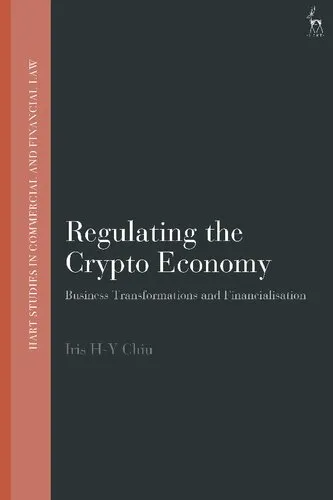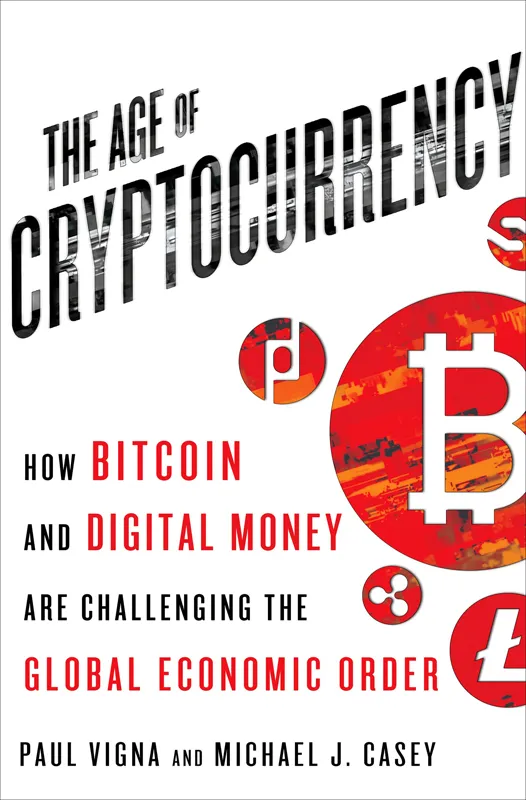Regulating the Crypto Economy: Business Transformations and Financialisation
4.0
بر اساس نظر کاربران

شما میتونید سوالاتتون در باره کتاب رو از هوش مصنوعیش بعد از ورود بپرسید
هر دانلود یا پرسش از هوش مصنوعی 2 امتیاز لازم دارد، برای بدست آوردن امتیاز رایگان، به صفحه ی راهنمای امتیازات سر بزنید و یک سری کار ارزشمند انجام بدینکتاب های مرتبط:
معرفی کتاب "Regulating the Crypto Economy: Business Transformations and Financialisation"
کتاب "Regulating the Crypto Economy: Business Transformations and Financialisation" نوشته ایرِس هی چیو، به بررسی عمیق اقتصاد کریپتو و چالشهای قانونی و اقتصادی آن در دنیای مدرن میپردازد. این کتاب یک راهنمای جامع برای فهم تعاملات بین تکنولوژیهای نوین مثل Blockchain، مفاهیم مالیسازی (Financialisation) و تغییراتی که این نوآوریها در ساختار کسبوکارهای جهانی ایجاد میکنند، ارائه میدهد.
خلاصهای از محتوای کتاب
این کتاب در هفت فصل، به کاوش در پدیده اقتصاد کریپتو (Crypto Economy) میپردازد و به صورت عمیق موضوعات مرتبط با کاربرد، مشکلات، و تحولاتی که این داراییهای دیجیتال در اقتصادهای سنتی و شیوههای نظارتی ایجاد میکنند، بررسی میکند. ایرِس به تحلیل نحوه عملکرد Cryptocurrencyها مانند بیتکوین و Ethereum پرداخته و در این مسیر شفافسازی از پیچیدگیهای قانونی و روابط مالی مینماید.
همچنین کتاب به نحوه تکامل نهادهای نظارتی در مواجهه با بحرانها و چالشهای اقتصادی ناشی از رشد اکوسیستم داراییهای دیجیتال توجه ویژهای دارد. فصلهای مختلف کتاب، هم نیاز به مقرراتگذاری (Regulation) و هم تأثیرات اجتماعی و مالی فنآوریهای جدید مانند Smart Contracts و DeFi (Decentralized Finance) را تحلیل میکنند.
مهمترین نکات و دستاوردهای کتاب
از جمله نکات کلیدی کتاب میتوان به موارد زیر اشاره کرد:
- نقش Blockchain و سایر تکنولوژیهای مرتبط در تحولات مالی و اقتصادی.
- تبعات مالیسازی اقتصاد کریپتو و خطرات احتمالی آن برای اقتصاد جهانی.
- چگونگی تنظیم مقررات تطبیقی برای حمایت از مصرفکنندگان و نهادهای مالی.
- نقش بانکهای مرکزی و دولتها در تأمین پایداری در عصر ارزهای دیجیتال.
این کتاب به خوانندگان کمک میکند تا ارتباط بین تحولات تکنولوژیک و قوانین مالی را بهتر درک کنند و همچنین به شیوهای عملی نشان میدهد که چگونه میتوان روابط بین اکوسیستم دیجیتال و جهان سنتی را بهبود بخشید.
جملات معروف از کتاب
"Cryptocurrencyها دیگر صرفاً یک پدیده تکنولوژیک نیستند؛ بلکه به بخشی اساسی از دنیای اقتصادی و مالی ما تبدیل شدهاند که نیازمند تنظیم و تفسیر مداوم هستند."
"ایجاد توازن میان نوآوری و امنیت اقتصادی چالش اصلی تنظیمکنندگان در عصر دیجیتال است."
چرا این کتاب مهم است؟
کتاب "Regulating the Crypto Economy" به دلایل متعددی یک اثر اساسی و مهم به شمار میرود. در عصر چالشهای فناوری و ظهور داراییهای جدید که اقتصاد جهانی را تحت تأثیر قرار داده است، این کتاب برای سیاستگذاران، اقتصاددانها، و حتی علاقهمندان به دنیای ارزهای دیجیتال یک مرجع کلیدی است.
اهمیت این کتاب در این است که نه تنها مسائل حال حاضر را به وضوح مطرح میکند، بلکه به آینده اقتصاد دیجیتال و نحوه مدیریت و مقررات آن نیز میپردازد. این اثر راهکارهای ایجاد تعادل میان نوآوری و حفاظت از منافع عمومی را ارائه میدهد و به صورت سازندهای بر توسعه پایدار اشاره دارد.
همچنین، این کتاب برای کسانی که در زمینه قانونگذاری، بانکداری و یا فناوریهای نوین مانند FinTech فعالیت میکنند، یک اثر کاربردی و تأثیرگذار است و اطلاعات بهروز و جامعی را ارائه میکند.
Introduction to "Regulating the Crypto Economy: Business Transformations and Financialisation"
The rapid expansion of digital innovation has deeply altered global financial systems, and at the heart of this transformation is the emergence of cryptocurrencies and blockchain technologies. "Regulating the Crypto Economy: Business Transformations and Financialisation", authored by Iris H-Y Chiu, provides a deep and analytical exploration of these developments. It focuses on the evolution of the crypto economy, its potential to disrupt traditional financial systems, and the necessity of robust regulatory frameworks to maintain stability and public trust.
This book dives into the intricacies of cryptocurrencies, decentralised finance (DeFi), tokenisation, and blockchain technologies to uncover how these innovations are re-shaping markets, investments, and financial conventions. It explores the tension between innovation and regulation, underscoring how policymakers and industry stakeholders navigate the challenges of creating frameworks that safeguard public interests while fostering innovation.
Whether you're an academic, entrepreneur, financier, policymaker, or simply an enthusiast keen on understanding the implications of crypto adoption, this book offers an invaluable roadmap for grappling with the complexities of this novel economic paradigm.
Detailed Summary
"Regulating the Crypto Economy" discusses the convergence of technology, economics, and law, with a primary focus on cryptocurrencies as a transformative force in the financial landscape. The book offers a cohesive narrative that starts with the origins of cryptocurrencies, the growth of the blockchain ecosystem, and the economic transformations driven by decentralised technologies.
The book delves into critical topics, such as cryptocurrency usage in payments and financial services, the rise of decentralised finance (DeFi), and the complexities of tokenising assets and securities. It also unpacks issues surrounding investor protection, market volatility, money laundering, and the challenges of sovereign regulatory frameworks when tackling global phenomena like cryptocurrencies.
A substantial portion of the book is dedicated to discussing financialisation through cryptocurrencies. By analysing how blockchain technologies underpin new forms of value accumulation, capital mobilisation, and market instruments, the book explains the societal and systemic impacts of these transformations. Simultaneously, it addresses the tension between decentralisation ideals and the reality of centralised governance structures required for regulatory oversight.
Ultimately, the book advocates well-balanced regulatory infrastructures. It doesn’t dismiss innovation but argues that sound governance, trust, and transparency are essential for the sustained growth of the crypto economy.
Key Takeaways
- Cryptocurrencies and blockchain technologies are reshaping businesses, governance, and financial systems on a global scale.
- Proper regulation is critical to mitigating risks such as fraud, financial instability, and illicit activities in the crypto economy.
- Decentralised finance (DeFi) platforms challenge traditional financial intermediaries but raise concerns about governance and consumer protections.
- Technological innovation and regulation must coexist to foster trust and sustainability in the crypto landscape.
- The cryptocurrency market represents a complex interplay between decentralisation ideals and centralisation requirements of practical governance.
Famous Quotes
"In a world increasingly shaped by code, the line between technology and public governance is thinning, raising questions of accountability, ethics, and trust."
"Crypto-assets are not just financial instruments; they are embedded in narratives of disruption, empowerment, and the re-imagination of economic structures."
"Regulation should not suppress innovation; it must strike a balance, nurturing the integrity of markets while holding the door open to technological progress."
Why This Book Matters
This book is highly significant in today's context of digital transformation and the rise of decentralised economies. Cryptocurrencies and DeFi are no longer fringe innovations; they are influencing mainstream finance and societal systems globally. However, these shifts come with complexities requiring intellectual engagement and regulatory foresight.
"Regulating the Crypto Economy" brings clarity to this complex subject, offering a balanced perspective that combines academic rigour, empirical insights, and policy recommendations. It addresses a key challenge of our time: how to govern transformative technological revolutions without stifling their potential.
As humanity navigates unprecedented changes in financial technology, this book equips readers with the tools to understand, critique, and contribute meaningfully to a future in which innovation and regulation coexist in harmony.
دانلود رایگان مستقیم
شما میتونید سوالاتتون در باره کتاب رو از هوش مصنوعیش بعد از ورود بپرسید
دسترسی به کتابها از طریق پلتفرمهای قانونی و کتابخانههای عمومی نه تنها از حقوق نویسندگان و ناشران حمایت میکند، بلکه به پایداری فرهنگ کتابخوانی نیز کمک میرساند. پیش از دانلود، لحظهای به بررسی این گزینهها فکر کنید.
این کتاب رو در پلتفرم های دیگه ببینید
WorldCat به شما کمک میکنه تا کتاب ها رو در کتابخانه های سراسر دنیا پیدا کنید
امتیازها، نظرات تخصصی و صحبت ها درباره کتاب را در Goodreads ببینید
کتابهای کمیاب یا دست دوم را در AbeBooks پیدا کنید و بخرید
1274
بازدید4.0
امتیاز0
نظر98%
رضایتنظرات:
4.0
بر اساس 0 نظر کاربران
Questions & Answers
Ask questions about this book or help others by answering
No questions yet. Be the first to ask!














